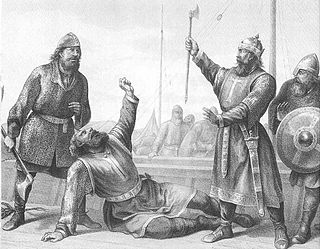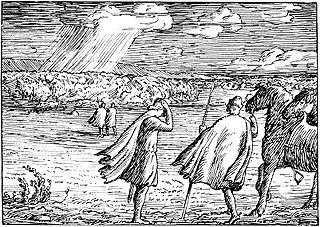Related Research Articles

Olaf II Haraldsson, later known as Saint Olaf, was King of Norway from 1015 to 1028. Son of Harald Grenske, a petty king in Vestfold, Norway, he was posthumously given the title Rex Perpetuus Norvegiae and canonised at Nidaros (Trondheim) by Bishop Grimketel, one year after his death in the Battle of Stiklestad on 29 July 1030. His remains were enshrined in Nidaros Cathedral, built over his burial site. His sainthood encouraged the widespread adoption of Christianity by Scandinavia's Vikings/Norsemen.

Olaf III or Olaf Haraldsson, known as Olaf the Peaceful, was King of Norway from 1067 until his death in 1093.
Erling Skakke was a Norwegian Jarl during the 12th century. He was the father of Magnus V, who reigned as King of Norway from 1161 to 1184.

Battle of Nesjar was a sea battle off the coast of Norway in 1016. It was a primary event in the reign of King Olav Haraldsson. Icelandic skald and court poet Sigvatr Þórðarson composed the poem Nesjavísur in memory of the battle. A monument known as the Nesjar Monument was erected on the 1000th anniversary of the battle, located in Helgeroa village in Larvik, Vestfold County, where the battle is believed to have occurred.

Thorir Hund was one of the greatest chiefs in Hålogaland. Tore Hund was one of the leaders of the Stiklestad farmer faction opposing Norwegian King Olaf II of Norway, later named St. Olaf. He was reported to have been among the chieftains who killed the king in the Battle of Stiklestad in 1030. He also served in the forces of King Canute the Great on several occasions.

Erling Skjalgsson, på Sola, "Rygekongen", Herse/Høvding i Rogaland, was a Norwegian political leader of the late 10th and early 11th centuries. He has been commonly seen as this period's foremost defender of the historic Norwegian social system. Erling fought for the traditional small, autonomous kingdoms and the þing system, against the reformists of the Fairhair family line.

Rex Perpetuus Norvegiæ is a term for King Olaf II of Norway, also known as Saint Olaf.
Events in the year 1956 in Norway.
Events in the year 1998 in Norway.
Kristin Sigurdsdatter was a Norwegian princess and mother of King Magnus V of Norway.
Events from the 1030s in Norway.
Events in the year 1047 in Norway.
Events in the year 1093 in Norway.
Events in the year 1157 in Norway.
Events in the year 1069 in Norway.

Kálfr Árnason was an 11th-century Norwegian chieftain who played a major role both in defeating King Olaf Haraldsson at the Battle of Stiklestad and in bringing back his young son Magnus and raising him to the throne.

Hårek of Tjøtta was a Norwegian farmer and local chieftain. He was a son of the skald, Eyvindr skáldaspillir, who ruled from Tjøttagodset. Hårek resided at Tjøtta in Nordland, and had significant influence in the district of Hålogaland. He participated in the Battle of Stiklestad in 1030, where his farmer army defeated Olaf Haraldsson. Six years later when visiting king Magnus Olavsson I also known as Magnus the Good in Trondheim, he was killed by axe in 1036 by rival chieftain Åsmund Grankjellsson, and thus the former king's son got his revenge.
Events from the 1010s in Norway.
References
- ↑ "Olaf II Haraldsson | king of Norway".
- ↑ http://familytreemaker.genealogy.com/users/h/o/f/Jeanne-M-Hoflen/WEBSITE-0001/UHP-0975.html [ user-generated source ]
- ↑ Krag, Claus. "Olav 2 Haraldsson Den Hellige". In Helle, Knut (ed.). Norsk biografisk leksikon (in Norwegian). Oslo: Kunnskapsforlaget. Retrieved 19 August 2015.
- ↑ Krag, Claus. "Olav 2 Haraldsson Den Hellige". In Helle, Knut (ed.). Norsk biografisk leksikon (in Norwegian). Oslo: Kunnskapsforlaget. Retrieved 16 August 2015.
- ↑ Krag, Claus (28 September 2014). "Magnus 1 Olavsson Den Gode". In Helle, Knut (ed.). Norsk biografisk leksikon (in Norwegian). Oslo: Kunnskapsforlaget. Retrieved 22 July 2015.
- ↑ Krag, Claus. "Erling Skjalgsson". In Helle, Knut (ed.). Norsk biografisk leksikon (in Norwegian). Oslo: Kunnskapsforlaget. Retrieved 19 August 2015.